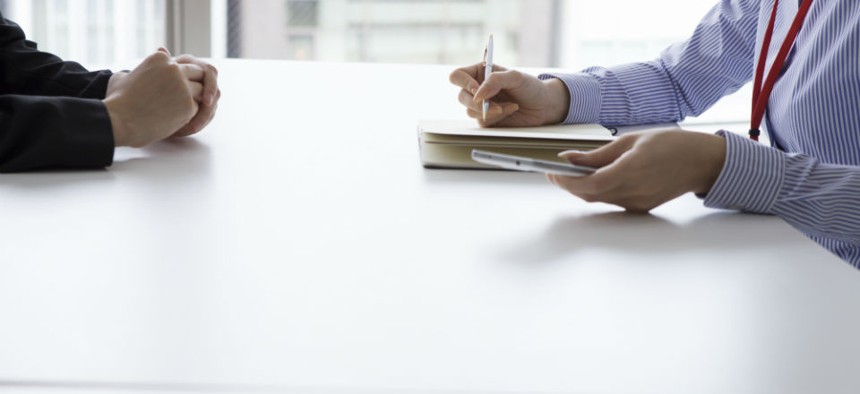
Reo/Shutterstock.com
One Way to Tackle Job Interview Jitters
Don't let your negative inner monologue take over.
When we lose ourselves in a stressful moment—a workplace situation can quickly escalate from challenging to completely overwhelming.
For many of us, job interviews are a common scenario that can trigger strong responses; anticipation, excitement, trepidation, anxiety. If you’ve sat in the interview chair, you are likely aware of the struggles we all face to remain calm and focused. As much as we might attempt to stay composed—our minds can race out of control—not unlike a runaway train. Managing ourselves through this stressful dynamic is key. Could the concept of mindfulness possibly help all of us through the challenge of an interview? Recent research tells us that it can.
Tough workplace scenarios can cause our “fight or flight” response to kick in—and job interviews qualify.
Labeled “Amygdala Hijacks” by psychologist Daniel Goleman, these moments are characterized by a neurological process in which our “rational brain” (neocortex) becomes overpowered by our emotional brain. This renders us in a weakened position to deal with many situations effectively.
Mindfulness is defined as “the psychological state where you focus on the events of the present moment” and allows us to observe the events of our lives from a safer distance, without necessarily reacting in that moment. One key element, is the notion of equanimity, or “nonreactivity” to the events happening around us. Mindfulness tells us to pay attention and acknowledge both one’s inner experience and the outer world, without labeling what is occurring as good or bad. It allows us to absorb what is going on around us.
Discussed at length, concerning its impact on both our psychological and physical well-being, mindfulness can help us remain balanced in many situations that might normally derail us. One recent study links mindfulness to effective workplace behavior. The research revealed that mindfulness may help with roles that require a series of decisions in quick succession—not unlike the multiple decisions/responses we face during a job interview. Managing our automatic responses, and refocusing that energy toward staying composed is key.
How might mindfulness help us during an interview? Above all, you want to represent yourself accurately. Regrets concerning what you may have forgotten to mention (or did mention and didn't mean to reveal) can prove critical. During interviews we can become overwhelmed and lose our heads, losing focus on the goals of the conversation. (You might also find yourself either rushing ahead or reviewing your last answer, for example.) Above all, if you fail to remain fully present, you may miss important conversational cues that will help you represent yourself well.
We needn’t wait for our next interview to develop techniques to become more mindful. Here are a few things to consider:
- Practice the art of micro-meditation. These are short periods of time to stop (perhaps when you feel yourself becoming anxious) and become fully present in the "here and now." For example, while waiting for the interview to begin (seems these things are always delayed), utilize the following acronym taught at Google: SBNRR—Stop. Breathe. Notice. Reflect. Respond.
- Tame the inner voice. Don’t let an inner monologue take over during the interview. (For many of us this is negative.) Be aware of a “less than supportive” inner dialogue that might rear its ugly head. Consciously interrupt it, and replace it with a less judgmental voice.
- Refocus on your ultimate goal. Remind yourself of the purpose of the interview: to accurately portray yourself as a contributor. We all have topic triggers that cause us to lose focus and react. Monitor your reaction to these topics, and remind yourself to stay ahead of your usual response pattern.
- Stay in the moment. While we can’t halt the interview for a quick meditation break—we can silently tap ourselves on the shoulder to remind ourselves to remain fully present. When you feel your mind racing ahead or meandering back to something already said, mentally pause and tap. (Plant a reminder to help you recalibrate, such as wearing your watch upside down.)
- Bring along a mental list. Enter the interview with three or four critical points that you wish to leave with the interviewer. Use mindfulness techniques to pause, circle back and ensure that these key points are brought into the conversation.
How do you stay calm and focused during an interview? Have you integrated mindfulness strategies into your work life? Share your strategies.
Marla Gottschalk is an industrial/organizational psychologist. She is the director of thought leadership at Kilberry Leadership Advisors, Toronto.
(Image via Reo/Shutterstock.com)
NEXT STORY: Secret Service Removes Top Executives






